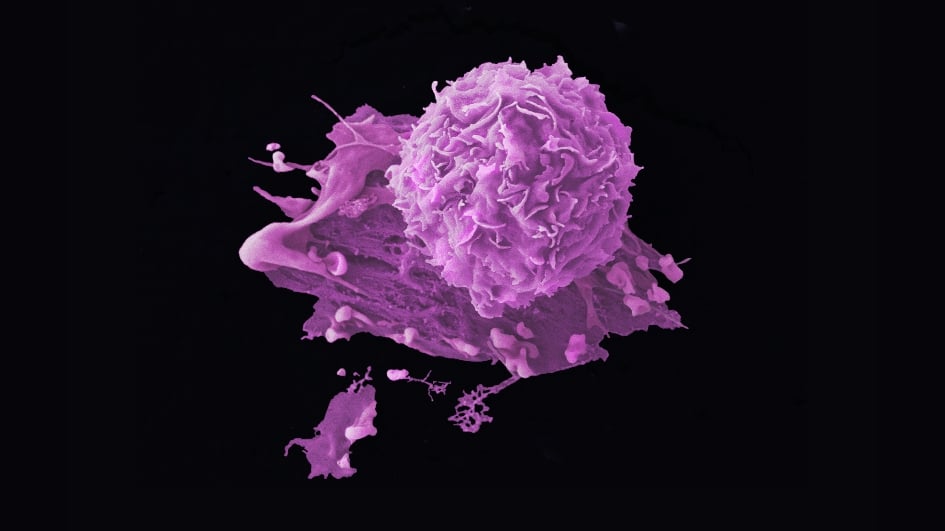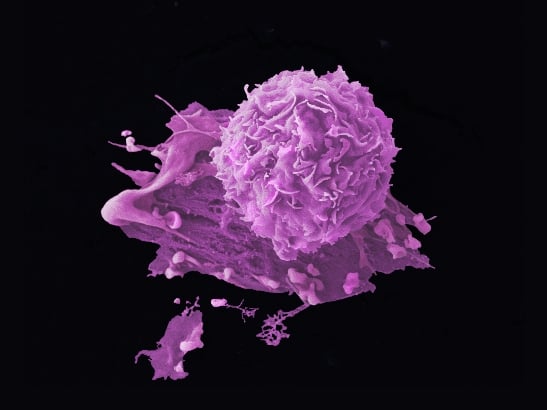
Image: Breast cancer cells. Anne Weston, Francis Crick Institute.
A new study sheds light on the genetic messages encoded by genes within ‘triple negative’ breast cancers – and poses important questions on how they could be better treated in future.
The study, by researchers at The Institute of Cancer Research, London, and published today in Clinical Cancer Research, shows that certain characteristics within patients' primary tumours can predict how they will respond to different treatments after their tumours have spread around the body.
For example, women whose primary tumours have a higher presence of immune cell genes, and genes linked to their activity, are more likely to respond to a specific type of chemotherapy called docetaxel than another called carboplatin.
And patients whose cancer has spread but who have not yet received chemotherapy, and whose primary tumours have markers of faults in genes linked to DNA repair pathways, tend to respond better to carboplatin.
Accelerate the development of personalised treatments
The presence of these characteristics, or ‘biomarkers’, can be tested for in the clinic and could be used to accelerate the development of more personalised treatments for triple negative breast cancers.
They also found that while some markers in primary tumours can still predict responses by the time cancer has spread around the body, other markers have changed significantly by this point. They therefore recommend a careful approach to using primary tumour biomarkers to predict responses in advanced cancers.
Around 15 per cent of all breast cancers are triple negative. These cancers are not driven by any of the three molecules that can be blocked by targeted hormone receptor drugs – the HER2 protein and two hormone receptors for oestrogen and progesterone – and so current treatment options are limited.
These cancers also tend to be more aggressive and disproportionately affect younger women and Black women.
Scientists from the ICR aimed to better understand the underlying biology behind responses to different chemotherapies amongst women with triple negative breast cancer that had turned ‘metastatic’, or spread.
In the new study researchers looked at biopsies taken when patients had had their initial surgery from 186 women who took part in a trial for subsequent recurrent breast cancer called TNT. The study was funded by the ICR, which is a research institute and a charity, Breast Cancer Now, Cancer Research UK and the USA NCI.
The TNT trial, which was managed by the Cancer Research UK funded Clinical Trials and Statistics Unit (ICR-CTSU) at the ICR, has already shown in previously published work that carboplatin is more effective than docetaxel for women whose primary tumours have mutations in the BRCA1 or BRCA2 genes.
In the new study, the researchers were aiming to better understand whether other genetic markers in these patients' primary tumours could be used to determine their best treatment option.
Patients with high levels of markers related to immune pathways in their primary tumours were more likely to see their tumours shrink, or remain stable, when taking docetaxel for advanced breast cancer than patients without the markers. Immune features were not linked to carboplatin response.
In samples from patients who had not yet received chemotherapy, those with elevated markers related to faults in the pathways cancer cells use to repair their DNA tended to respond better to carboplatin. But these markers had no impact on response to docetaxel.
Biomarkers could be investigated in clinical trials
The findings suggest it might be possible to predict who will benefit from carboplatin and docetaxel using a range of different biomarkers and suggest further investigation of these biomarkers in clinical trials is warranted.
The researchers also explored whether immune signatures were conserved between primary tumour samples and secondary tumour samples taken after the cancer had become metastatic.
Although immune features remained relatively stable, RNA-based features related to DNA damage repair pathways changed significantly.
The authors therefore recommend against doctors routinely using biopsies taken from primary tumour samples to carry out gene-expression (RNA)-based biomarker tests for guiding the treatment for secondary cancers.
They suggest it would be better to use biopsies taken from secondary tumours as the cancers can evolve between first diagnosis and recurrence after initial therapy.
Dr Maggie Cheang, Group Leader of the ICR-CTSU Integrative Genomics Analysis in Trials group at The Institute of Cancer Research, London, who led the research, said:
"This is one of the first few studies to demonstrate how we embed discovery science within our clinical trial by generating high-quality, multi-dimensional biological data from routine clinical samples taken in clinical trials. We applied cutting edge whole genome RNA sequencing on tissue samples preserved in paraffin wax in a technique that we optimised through collaboration with colleagues at University of North Carolina at Chapel Hill. By combining all these data together, we are able to paint a comprehensive picture of patients’ individual tumour biology.”
Maximise knowledge from clinical trial data and samples
Holly Tovey, PhD Student within Dr Cheang’s group at The Institute of Cancer Research, London said:
"This study is a great example of how we can make the most of the data and samples collected routinely within our clinical trials to maximise the knowledge gained from each study.
"While each individual marker provides useful predictive information, there is more to the story. Advanced statistical methods have enabled us to integrate many different markers across several layers of biology and gain a more comprehensive picture of the biology of primary tumours, and how they relate to treatment responses in the advanced disease.”
Professor Andrew Tutt, Director of the Breast Cancer Now Toby Robins Research Centre at the ICR and Chief Investigator of the TNT trial, said:
"Triple negative breast cancers lack hormone receptors or the HER2 protein target and therefore are not treated with many of our targeted therapies for breast cancer – so chemotherapy remains the main treatment option. Women with this type of cancer are in real need of better, more personalised options.
"Our analysis takes a deep dive into tumour biology and how different tumour characteristics can predict which treatment patients' tumours will respond to. Our findings paint a complex picture – with many, dynamic factors driving how tumours respond to treatment. I hope this work will contribute to a future where patients with triple negative breast cancer have more effective and personalised treatment options which extend their lives."
